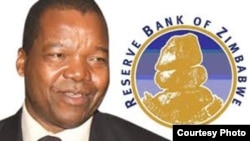HARARE —
Zimbabwe’s new central bank governor John Mangudya officially started his new job Thursday taking over from Gideon Gono.
As the Reserve Bank of Zimbabwe (RBZ) chief begins his five-year term of office, local people say he should ensure that there is regular money supply in the market in order to boost the country’s ailing economy.
Many Zimbabweans such as Harare-based Nomatter Chipunga who operates a weaving shop in the central business district, say they have high expectations from the new RBZ governor.
Chipunga says there is currently little money in the market resulting in her business failing to flourish.
For businesses to boom, Westgate resident Clarah Chaparadza adds that banks should be re-capitalised.
The acting president of the Zimbabwe Chamber of Informal Economy Associations, Lucia Masekesa, also says her organization expects the new central bank chief to come up with policies that, unlike in the Gono era, would ensure that there is broad money supply in the market.
Masekesa says that the country’s financial policies should be re-aligned with the national budget that recognizes informal trading as a major sector in the country. The majority of Zimbabweans are believed to be in the informal sector due to slow growth in the formal sector resulting from lack of capital, deflation and other crippling factors.
The new economic blueprint, the Zimbabwe Agenda for Socio-Economic Transformation or ZIMASSET, also priorities the informal sector though resources have not been found to finance the economic revival program.
Former Harare city councilor, Warship Dumba, says there is need for the new governor to work with authorities to craft economic policies that do not scare away potential investors.
Dumba warns that foreign direct investment will remain a thing of the past as long as Zimbabwe maintains its black empowerment policies.
Joey Mabenge, board chairperson of the Zimbabwe Coalition on Debt and Development, agrees, adding that little is expected from Mangudya in terms of clearing the country’s foreign debt because the RBZ has ceased to be an autonomous body as it appears as if it is now being controlled by Zanu PF.
Mangudya’s predecessor, Gono, whose term of office expired recently, declared that he was a Zanu PF member.
Mabenge says despite Mangudya’s well-decorated resume, the new central bank chief won’t do much since he is President Robert Mugabe’s political appointee.
Economist Prosper Chitambara of the Labor and Economic Development Institute of the Zimbabwe Congress of Trade Unions echoes the same sentiments, saying Mangudya will have no business in controlling money supply in the market because Zimbabwe is using a multi-currency system.
At the same time, Chitambara believes that Zimbabwe cannot do business with other countries because of deflation.
Masimba Manyanya, a former chief economist in the finance ministry and co-author of an economic book called ‘Zimbabwe’s Plunge’, says Mangudya may not make it to a second term because of political pressure. During Gono’s tenure, the central bank introduced several quasi-fiscal activities that were blamed by some economists for worsening the country’s economic situation. Gono argued that he was rescuing the country’s economy from imminent collapse.
THE Reserve Bank of Zimbabwe has admitted liability over hundreds of millions of dollars seized from local commercial banks following a directive by Gono in 2007. Some private companies have already sued the bank which is failing to repay the money. Independent economists say the RBZ is currently not playing its major role of lender of last resort due to lack of capitalization.
Mangudya, who was the chief executive officer of the Commercial Bank of Zimbabwe prior to his new appointment, requested questions in writing but had not returned them at the time of going air.
As the Reserve Bank of Zimbabwe (RBZ) chief begins his five-year term of office, local people say he should ensure that there is regular money supply in the market in order to boost the country’s ailing economy.
Many Zimbabweans such as Harare-based Nomatter Chipunga who operates a weaving shop in the central business district, say they have high expectations from the new RBZ governor.
Chipunga says there is currently little money in the market resulting in her business failing to flourish.
For businesses to boom, Westgate resident Clarah Chaparadza adds that banks should be re-capitalised.
The acting president of the Zimbabwe Chamber of Informal Economy Associations, Lucia Masekesa, also says her organization expects the new central bank chief to come up with policies that, unlike in the Gono era, would ensure that there is broad money supply in the market.
Masekesa says that the country’s financial policies should be re-aligned with the national budget that recognizes informal trading as a major sector in the country. The majority of Zimbabweans are believed to be in the informal sector due to slow growth in the formal sector resulting from lack of capital, deflation and other crippling factors.
The new economic blueprint, the Zimbabwe Agenda for Socio-Economic Transformation or ZIMASSET, also priorities the informal sector though resources have not been found to finance the economic revival program.
Former Harare city councilor, Warship Dumba, says there is need for the new governor to work with authorities to craft economic policies that do not scare away potential investors.
Dumba warns that foreign direct investment will remain a thing of the past as long as Zimbabwe maintains its black empowerment policies.
Joey Mabenge, board chairperson of the Zimbabwe Coalition on Debt and Development, agrees, adding that little is expected from Mangudya in terms of clearing the country’s foreign debt because the RBZ has ceased to be an autonomous body as it appears as if it is now being controlled by Zanu PF.
Mangudya’s predecessor, Gono, whose term of office expired recently, declared that he was a Zanu PF member.
Mabenge says despite Mangudya’s well-decorated resume, the new central bank chief won’t do much since he is President Robert Mugabe’s political appointee.
Economist Prosper Chitambara of the Labor and Economic Development Institute of the Zimbabwe Congress of Trade Unions echoes the same sentiments, saying Mangudya will have no business in controlling money supply in the market because Zimbabwe is using a multi-currency system.
At the same time, Chitambara believes that Zimbabwe cannot do business with other countries because of deflation.
Masimba Manyanya, a former chief economist in the finance ministry and co-author of an economic book called ‘Zimbabwe’s Plunge’, says Mangudya may not make it to a second term because of political pressure. During Gono’s tenure, the central bank introduced several quasi-fiscal activities that were blamed by some economists for worsening the country’s economic situation. Gono argued that he was rescuing the country’s economy from imminent collapse.
THE Reserve Bank of Zimbabwe has admitted liability over hundreds of millions of dollars seized from local commercial banks following a directive by Gono in 2007. Some private companies have already sued the bank which is failing to repay the money. Independent economists say the RBZ is currently not playing its major role of lender of last resort due to lack of capitalization.
Mangudya, who was the chief executive officer of the Commercial Bank of Zimbabwe prior to his new appointment, requested questions in writing but had not returned them at the time of going air.






